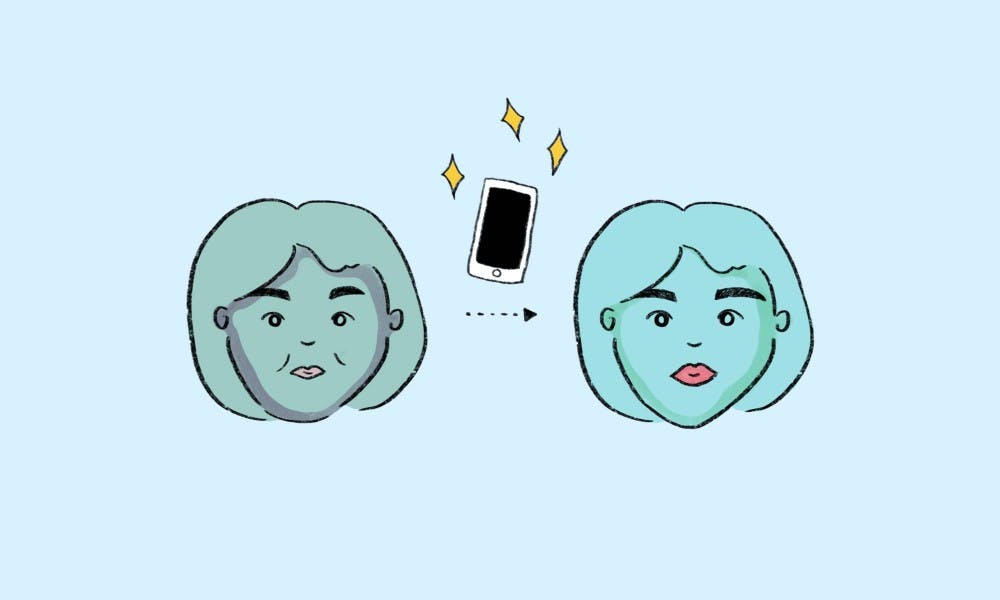
For $2.99 on the App Store, you can join the 50 million other users who have downloaded Facetune. You can also join the ranks of celebrities and everyday people accused of presenting a false version of themselves online.
Platforms such as Instagram and Snapchat already encourage posting the best parts of yourself. So how is editing out a stray lock of hair or cinching your waist any less harmful than only posting your spring break pics to Cancun and not your sleepless nights in the library drying your tears with Spanish flashcards? Everybody everywhere publicly posts the parts of themselves they are comfortable with the world seeing, so why are we so opposed to editing these parts even more?
Picture this — you snap a photo with your friends right before a party, and no one can agree on the best photo to post. In the first, one of your best friend’s eyes are closed; in the second, there’s an annoying blur in the background; the third just isn’t your best angle. With Facetune, these minor areas of chagrin can be blurred into non-existence, or manipulated into details you approve. It might sound like I’m being paid to say all of this, but I promise you, I am not a Facetune sponsor. I’m not even a Facetune user. But I do feel strongly that using Facetune isn’t the “catfishing” pit of evil that many seem to think it is.
I’m no stranger to insecurity. Who is? Often times, I look at a picture of myself and instantly wish I looked thinner. Contrary to my Instagram use, I hate taking pictures of myself. I don’t like subjecting myself to the comments I know I’ll make when my friend snaps a photo, shows it me, and I focus on only what I’d like to change. Using Facetune or other forms of photo editing to alter an image, to brighten your eyes, smooth out your skin, or tighten your waist to the size it was before lunch, isn’t the problem. Insecurities are personal, and would exist with or without altered images on the internet. Penn students are constantly accused of putting on a “Penn Face,” and to a certain extent, social media accounts are an extension of this same principle. Debunking the allure of Penn Face is brought about by recognizing and accepting our communal lack of perfection. And, it’s important to keep in mind that just as insecurities are different in everyone, our acceptance of our insecurities are similarly varied. Accepting our flaws doesn’t mean we need or want to broadcast them.
Comparing yourself to others is an unfortunate phenomenon that occurs with both a Facetuned photo and an unedited one. My insecurity over the size of my waist wouldn’t suddenly vanish if I looked at an unedited version of Kim Kardashian’s. The insecurity I feel about my body is mine, meaning learning to be comfortable with my appearance is an internal journey. And yes, it is immensely discouraging to be bombarded with images of models who seem so picture-perfect. But I think it’s important to take responsibility and ownership of our insecurities. I can’t blame Instagram for my self-doubt, so it would be unfair that I demand others not to use editing apps that make them feel better about the pictures they post.
Just like anything else, photo-editing can be taken too far. I encourage everyone to consider why they’re editing a photo when they do so. We all know that blemishes are a natural part of life. We all know this because we all get zits and we all know how annoying these breakouts are. But if posting a photo where you’ve retouched your skin so that zit on your forehead can’t be seen makes you feel more confident, who am I to judge? We can change our hair color in real life with wigs or hair dye, so why is doing the same thing on a photo-editing app so frowned upon?
We have a right to put our best face forward. I’m in no way saying you have to edit your photos. In this polarized culture of pro-editing versus anti-editing I’m saying that people should not be vilified or cut down for enhancing a photo of themselves just as a makeup and filter-free photo should not be seen as unusual or out of the ordinary. Our online presences are cultivated and people should be allowed to prune in whatever way they wish.

SOPHIA DUROSE is a College sophomore from Orlando, Fla. studying English. Her email address is sdurose@sas.upenn.edu.
The Daily Pennsylvanian is an independent, student-run newspaper. Please consider making a donation to support the coverage that shapes the University. Your generosity ensures a future of strong journalism at Penn.
Donate



